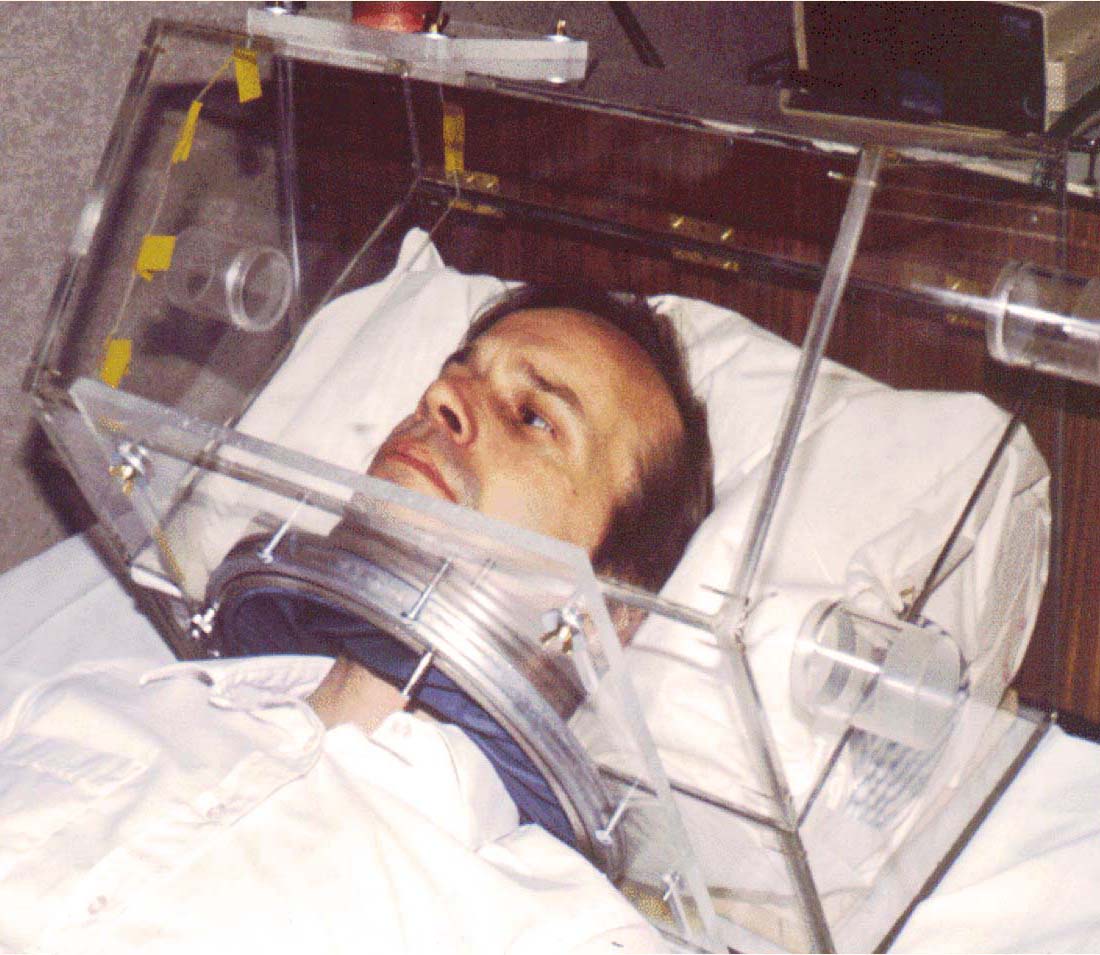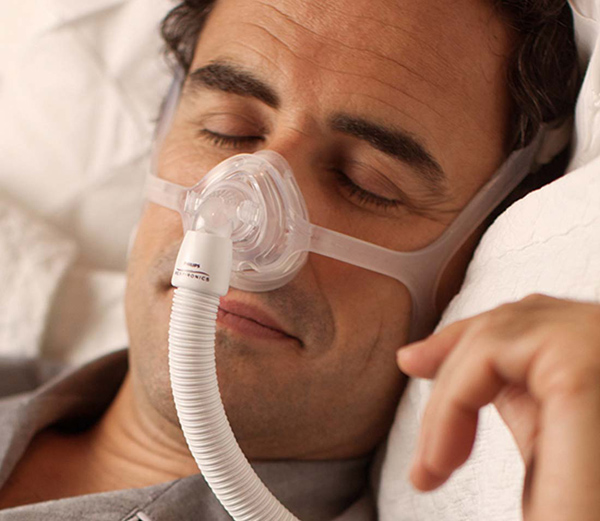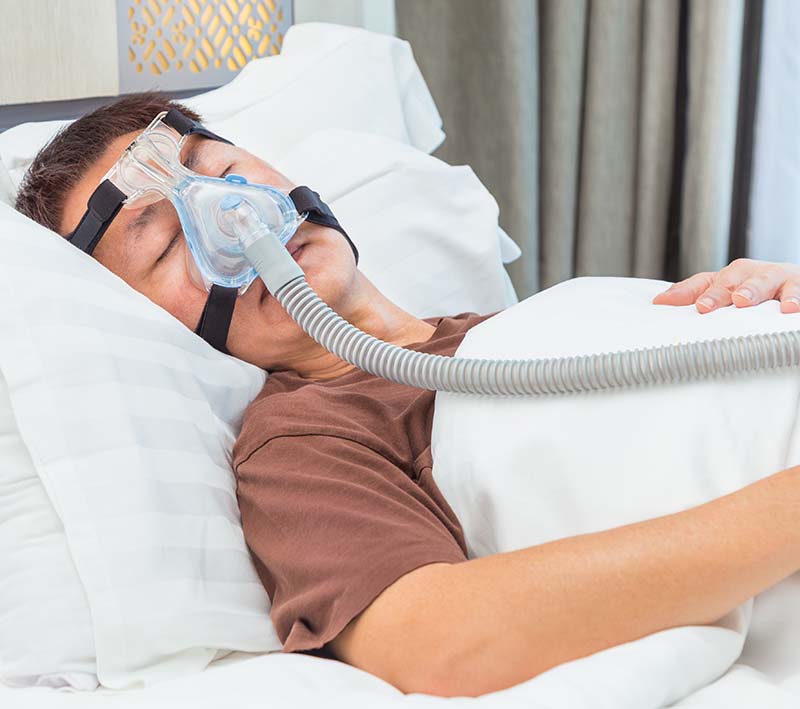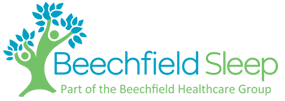Getting Started With CPAP Therapy
If you are reading this, you are either currently being tested for, or have been already diagnosed with Obstructive Sleep Apnoea (OSA). Not to worry, you are not alone, and Beechfield Sleep are here to help.
Although there are a few ways to treat OSA such as making lifestyle changes (i.e. losing weight), positional therapy devices and mandibular advancement devices, CPAP is the gold standard and the preferred treatment option of most sleep consultants.
Continuous Positive Airway Therapy (CPAP) essentially is a device used at night which delivers a prescribed air pressure via a mask to your airways. The primary aim of therapy is to ensure the airway is kept open so that apnoea’s do not occur.

Expectation

Reality
Types of CPAP Machines
Based on the results of your sleep study, your consultant/physiologist will prescribe a therapy which best suits your individual requirements to relieve symptoms. You will be commenced on one of the following therapies:
- CPAP – a fixed pressure which will provide a constant airflow as per prescription throughout the night.
- APAP (Automatic Positive Airway Pressure) – will provide a varied pressure throughout the night in concurrence with the amount/severity of apneas occurring in the airway.
- BiPAP (Bi-Level Therapy) – will provide a higher level of pressure upon inhaling but lower on exhaling. It is designed for people who need additional breathing support.
This may all sound overwhelming for you at the moment but whatever therapy you are commenced on, your Beechfield Sleep Patient Manager will be there to support you every step of the way!
Types of CPAP Masks
There are essentially 3 types of CPAP masks and each has its own pros and cons. Depending on your pressure setting, sleeping style and whether you have facial hair will determine which mask will suit you best. If you are new to CPAP therapy, we always recommend chatting with our patient managers and trying on a few types to find the one suits you best.
Nasal CPAP Mask
A nasal CPAP mask covers your nose from the bridge to the upper lip area. This delivers an indirect airflow to the airway via the nasal mask and works well for patients who need higher pressure settings. The nasal CPAP mask offers many versatile options and is a popular compromise between the bulky full-face CPAP mask and the lightweight nasal pillow mask
Nasal CPAP masks are generally more suited for people who:
- Move around in their sleep a lot.
- Need a higher pressure setting on their CPAP machine.
- Prefer a more natural airflow
The cons of nasal masks are:
- They are not as effective for those who breathe through their mouths when sleeping
- They are not as effective if you are suffering from a cold or have a history of allergies, or blockage of the sinuses
- May not be suitable for those who find it difficult to breathe through their nose due to certain medical conditions, like a deviated septum, narrowed or collapsed nasal valve, or enlarged turbinate’s.

Nasal Pillows CPAP Mask
Nasal pillows masks are a compact and lightweight option designed for minimal contact with the face. They work best with prescriptions of low-to moderate pressure settings, since airflow that is direct to the nostrils may be uncomfortable at high settings.
Nasal Pillows CPAP masks are generally more suited for people who:
- Toss and turn in their sleep
- Sleep on their side/ stomach
- Experience claustrophobia when wearing larger masks
- Breathe through their nose
- Have a lot of facial hair
- Watch television or read before they go to sleep
The cons of nasal pillows masks are:
- They are not suitable if you require higher pressure therapy
- They are not as effective for those who breathe through their mouths when sleeping
- Some users may experience higher incidences of nosebleeds or nasal dryness

Full Face CPAP Mask
Unlike nasal and nasal pillows masks that seal on the nose, the full-face mask covers both your mouth and nose. They cover a larger area of your face to create a CPAP seal over both airways. Although some people may find the bulky size of these masks a bit uncomfortable, they’re the perfect solution for those patients that require higher pressures, or if they breathe through their mouth.
Full Face CPAP masks are generally more suited for people who:
- Breathe through their mouth primarily
- Need a high-pressure CPAP setting
- Patients with frequent congestions due to cold symptoms
- Have allergies or other medical issues that make it difficult for them to breathe through their nose
- Sleep on their back
The cons of full face masks are:
- Higher chance of air leaking due to larger surface area.
- Some patients complain about irritated, dry eyes
- Not comfortable for people who like to sleep on their side or stomach
- The mask makes it hard for patients to wear glasses to watch TV or read

The Key to Successful Therapy
There is no overnight fix for sleep apnoea and some people take longer to see results than others. There are some things you can do to help things along and remember your Beechfield Sleep Patient Manager is just at the other end of the phone!

For CPAP therapy to be a success, it is essential that you always follow your consultant’s/physician’s recommendations. Afterall, they have devised a treatment plan tailored to your needs.
The only people qualified to change your CPAP settings are your consultant/sleep physiologist, your respiratory nurse, or your Beechfield Sleep Patient Manager.
Failure to follow your prescription will result in your treatment being ineffective and you will not experience the many benefits of therapy!
Get used to wearing your mask – in the initial stages of therapy, it is encouraged to wear your mask in the evening time around the house if possible, without being connected to your CPAP. This helps you to get used to the sensation of the mask on your face. It is like buying a new pair of shoes and breaking them in – the more you wear them, the more accustomed to them you will become.
Remember, it takes 21 days to make a habit – give your mask a fair chance!
What our customers say
Beechfield Sleep is an excellent company. They're reasonably priced and have a great range of products.
My patient manager Rosin is very well informed and provides a great back up service. She is always there at the end of the phone or to call out. I feel very safe with Beechfield Sleep.
I am delighted with the CPAP machine from Beechfield Sleep. I have been using it for over a month and even after the first night of using it, I couldn't believe how well I slept. It's fantastic to wake up feeling well-rested & refreshed. Thanks for the demonstration and information, you explained everything perfectly and I felt very confident using it on the first night and thereafter. It's also great to have you at the other end of the phone if I've any questions or concerns.
Thank you so much for all your help. After years of feeling exhausted, it's great to wake up feeling like I've actually slept. I would like to pay special thanks to all the staff who really explained everything in detail and who have been at the end of the phone for my constant questions! They have shown unbelievable patience, especially in getting the right mask! Thanks again, this has been life-changing

